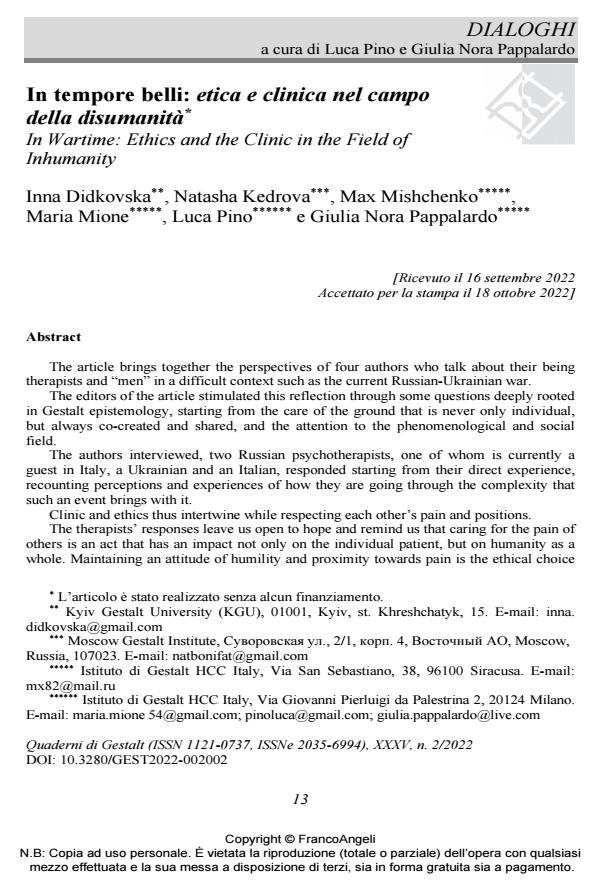In Wartime: Ethics and the Clinic in the Field of Inhumanity
Journal title QUADERNI DI GESTALT
Author/s Inna Didkovska, Natasha Kedrova, Max Mishchenko, Maria Mione, Luca Pino, Giulia Nora Pappalardo
Publishing Year 2022 Issue 2022/2
Language Italian Pages 19 P. 13-31 File size 209 KB
DOI 10.3280/GEST2022-002002
DOI is like a bar code for intellectual property: to have more infomation
click here
Below, you can see the article first page
If you want to buy this article in PDF format, you can do it, following the instructions to buy download credits

FrancoAngeli is member of Publishers International Linking Association, Inc (PILA), a not-for-profit association which run the CrossRef service enabling links to and from online scholarly content.
The article brings together the perspectives of four authors who talk about their being ther-apists and "men" in a difficult context such as the current Russian-Ukrainian war. The editors of the article stimulated this reflection through some questions deeply rooted in Gestalt epistemology, starting from the care of the ground that is never only individual, but always co-created and shared, and the attention to the phenomenological and social field. The authors interviewed, two Russian psychotherapists, one of whom is currently a guest in Italy, a Ukrainian and an Italian, responded starting from their direct experience, recounting perceptions and experiences of how they are going through the complexity that such an event brings with it. Clinic and ethics thus intertwine while respecting each other’s pain and positions. The therapists’ responses leave us open to hope and remind us that caring for the pain of others is an act that has an impact not only on the individual patient, but on humanity as a whole. Maintaining an attitude of humility and proximity towards pain is the ethical choice capable of stemming the narcissistic or individualistic drifts that can be triggered in a complex field full of anguish and death.
Keywords: Ethics in psychotherapy, wartime psychotherapy, phenomenological field, gestalt epistemology, clinical practice.
Inna Didkovska, Natasha Kedrova, Max Mishchenko, Maria Mione, Luca Pino, Giulia Nora Pappalardo, In tempore belli: etica e clinica nel campo della disumanità in "QUADERNI DI GESTALT" 2/2022, pp 13-31, DOI: 10.3280/GEST2022-002002